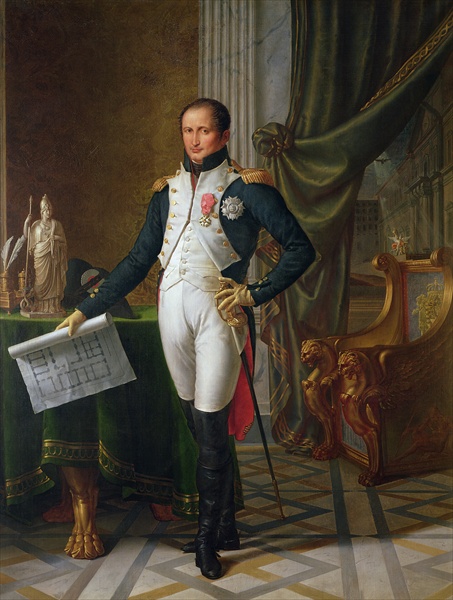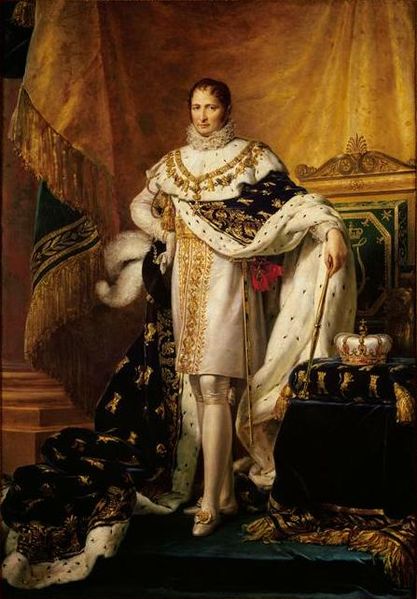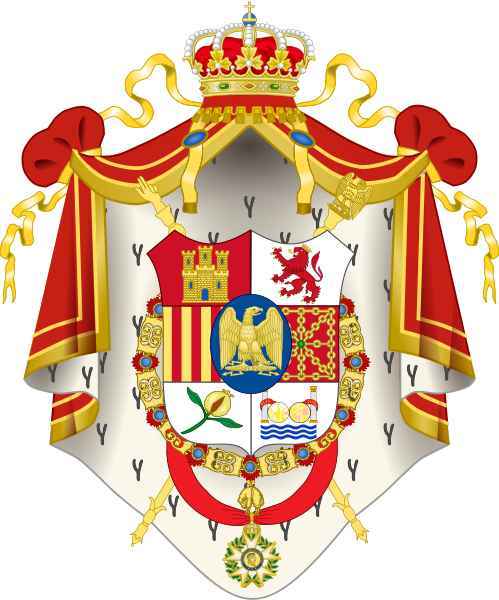<Back to Index>
- Inventor Johann Philipp Reis, 1834
- Composer Adam Krieger, 1634
- King of Naples and Sicily Joseph Napoléon Bonaparte, 1768
PAGE SPONSOR



Joseph-Napoléon Bonaparte (7 January 1768 – Italy, 28 July 1844) was the elder brother of Napoleon I of France, who made him King of Naples and Sicily (1806 – 1808), and later King of Spain and the Indies as Joseph I of Spain (1808 – 1813). After the fall of Napoleon I, Joseph styled himself "Comte de Survilliers".
Joseph was born Giuseppe Buonaparte in 1768 to Carlo Buonaparte and Maria Letizia Ramolino at Corte, the capital of the Corsican Republic. In the year of his birth Corsica was invaded by France and was conquered the following year. His father was originally a follower of the Corsican Patriot leader Pasquale Paoli but later became a supporter of French rule. As a lawyer, politician, and diplomat, Joseph served in the Cinq - Cents and was the French ambassador to Rome. He married Julie Clary on 1 August 1794 in Cuges - les - Pins, France. They had three daughters, Julie Joséphine Bonaparte (1796 – 1796), Zénaïde Laetitia Julie Bonaparte (1801 – 1854) and Charlotte Napoléone Bonaparte (1802 – 1839). He claimed the surviving two daughters as his heirs. He also sired two children with Maria Giulia, the Countess of Atri (Giulio, born 1806 and Teresa, born 1808). Joseph had two American daughters born at Point Breeze his estate in New Jersey by his mistress Annette Savage ("Madame de la Folie"), Pauline Anne who died young and Catherine Charlotte (b. 1822, d. 1890) who married Col. Zebulon Howell Benton of Jefferson County, New York, and had issue.
In 1795 Joseph was a member of the Council of Ancients where he used his position to help his brother overthrow the Directory.
The Château de Villandry had been seized by the French Revolutionary government and in the early 19th century Joseph's brother, Emperor Napoleon, acquired the château for him. In 1806, Joseph was given military command of Naples, and shortly afterward was made king by Napoleon, to be replaced after two years by his sister's husband, Joachim Murat, when Joseph was made king of Spain in August 1808, soon after the French invasion.
Joseph
somewhat reluctantly left Naples and arrived in Spain just in time for
the commencement of the Spanish revolt against French rule, and the
beginning of the Peninsular War.
After a series of early defeats of the French by the remnants of the
Spanish regular armies (stiffened by militia and guerrillas) Joseph
temporarily retreated with much of the French Army to northern Spain.
Feeling himself in an ignominious position, Joseph then proposed his
own abdication from the Spanish throne, hoping that Napoleon would
sanction his return to the Neapolitan Throne he had formerly occupied.
Napoleon dismissed Joseph's misgivings out of hand; and, to back up the
raw and ill trained levies he had initially allocated to Spain — the
Emperor sent heavy French reinforcements to assist Joseph in
maintaining his position as king of Spain. Despite the easy recapture
of Madrid, and nominal control by Joseph's government over many cities
and provinces, Joseph's reign over Spain was always tenuous at best,
and constantly resisted by pro-Bourbon guerrillas. Joseph and his supporters never established complete control over the country. King Joseph's Spanish supporters were called josefinos or afrancesados (frenchified). During his reign, he ended the Spanish Inquisition, partly because Napoleon was at odds with Pope Pius VII at the time. Despite such efforts to win popularity, Joseph's foreign birth and support, plus his membership in a Masonic lodge,
virtually guaranteed he would never be accepted as legitimate by the
bulk of the Spanish people. During Joseph's rule of Spain, Venezuela
declared independence (1810) from Spain, the first nation to do so. The
king had virtually no influence over the course of the ongoing Peninsular War:
Joseph's nominal command of French forces in Spain was mostly illusory,
as the French commanders theoretically subordinate to King Joseph
insisted on checking with Napoleon before carrying out Joseph's
instructions. King Joseph abdicated and returned to France after defeat at the Battle of Vitoria in 1813. He was seen by Bonapartists as the rightful Emperor of the French after the death of Napoleon's own son Napoleon II in 1832, although he did little to advance his claim. Joseph
lived primarily in the United States (where he sold the jewels of the
Spanish crown he had stolen when he left Spain) in the period 1817 - 1832, initially in New York City and Philadelphia, where his house became the centre of activity for French expatriates, but later moved to an estate, formerly owned by Stephen Sayre, called Point Breeze in Bordentown, New Jersey.
Joseph's home was located near the confluence of Crosswicks Creek and
the Delaware River. He considerably expanded Sayre's home and created
extensive gardens in the picturesque style. When his first home was
destroyed by fire in January 1820 he converted his stables into a
second grand house. At Point Breeze, Joseph entertained many of the
leading intellectuals and politicians of his day. He was also reputed to have encountered the Jersey Devil while hunting there. Joseph Bonaparte returned to Europe, where he died in Florence, Italy, and was buried in the Les Invalides building complex in Paris.